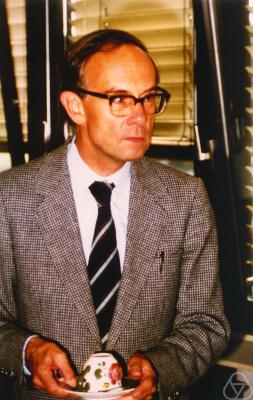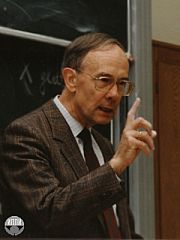<Back to Index>
- Mathematician Friedrich Ernst Peter Hirzebruch, 1927
- Writer Nathanael West (Nathan von Wallenstein Weinstein), 1903
- Politician and Islamic Reformer Syed Ahmed Khan, 1817
PAGE SPONSOR


Friedrich Ernst Peter Hirzebruch (17 October 1927 – 27 May 2012) was a German mathematician, working in the fields of topology, complex manifolds and algebraic geometry, and a leading figure in his generation. He has been described as "the most important mathematician in Germany of the postwar period.
He was born in Hamm, Westphalia. He studied at the University of Münster from 1945 – 1950, with one year at ETH Zürich. He then had a position at Erlangen, followed by the years 1952 – 54 at the Institute for Advanced Study in Princeton, New Jersey. After one year at Princeton University 1955 – 56, he was made a professor at the University of Bonn, where he remained, becoming director of the Max - Planck - Institut für Mathematik in 1981. More than 300 people participated in the event in celebration of his 80th birthday at Bonn in 2007.
The Hirzebruch – Riemann – Roch theorem (1954) for complex manifolds was a major advance and quickly became part of the mainstream developments around the classical Riemann – Roch theorem; it was also a precursor of the Atiyah – Singer index theorem. Hirzebruch's book Neue topologische Methoden in der algebraischen Geometrie (1956) was a basic text for the 'new methods' of sheaf theory, in complex algebraic geometry. He went on to write the foundational papers on topological K-theory with Michael Atiyah, and collaborate with Armand Borel on the theory of characteristic classes. In his later work he provided a detailed theory of Hilbert modular surfaces, working with Don Zagier.
In March 1945, Hirzebruch became a soldier, and in April, in the last
weeks of Hitler's rule, he was taken prisoner by the British forces
then invading German from the west. When a British soldier found that
he was studying mathematics, he drove him home and released him, and
told him to continue studying.
Hirzebruch died at the age of 84 on 27 May 2012.
Hirzebruch was a foreign member of numerous academies and societies, including the United States National Academy of Sciences, the Russian Academy of Sciences, and the French Academy of Sciences. In 1980/81 he delivered the first Sackler Distinguished Lecture in Israel.
Amongst many other honors, Hirzebruch was awarded a Wolf Prize in Mathematics in 1988, a Lobachevsky Medal in 1989. The government of Japan awarded him the Order of the Sacred Treasure in 1996. Hirzebruch won an Einstein Medal in 1999, and received the Cantor medal in 2004.